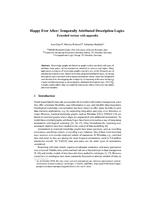Inproceedings3101: Unterschied zwischen den Versionen
Aus International Center for Computational Logic
Markus Krötzsch (Diskussion | Beiträge) (Die Seite wurde neu angelegt: „{{Publikation Erster Autor |ErsterAutorVorname=Ana |ErsterAutorNachname=Ozaki |FurtherAuthors=Markus Krötzsch; Sebastian Rudolph; }} {{Inproceedings |Referie…“) |
Markus Krötzsch (Diskussion | Beiträge) Keine Bearbeitungszusammenfassung |
||
| Zeile 2: | Zeile 2: | ||
|ErsterAutorVorname=Ana | |ErsterAutorVorname=Ana | ||
|ErsterAutorNachname=Ozaki | |ErsterAutorNachname=Ozaki | ||
|FurtherAuthors=Markus Krötzsch; Sebastian Rudolph; | |FurtherAuthors=Markus Krötzsch; Sebastian Rudolph; | ||
}} | }} | ||
{{Inproceedings | {{Inproceedings | ||
| Zeile 15: | Zeile 15: | ||
{{Publikation Details | {{Publikation Details | ||
|Abstract=Knowledge graphs are based on graph models enriched with (sets of) attribute-value pairs, called annotations, attached to vertices and edges. Many application scenarios of knowledge graphs crucially rely on the frequent use of annotations related to time. Based on recently proposed attributed logics, we design description logics enriched with temporal annotations whose values are interpreted over discrete time. Investigating the complexity of reasoning in this new formalism, it turns out that reasoning in our temporally attributed description logic ALCHT@ is highly undecidable; thus we establish restrictions where it becomes decidable, and even tractable. | |Abstract=Knowledge graphs are based on graph models enriched with (sets of) attribute-value pairs, called annotations, attached to vertices and edges. Many application scenarios of knowledge graphs crucially rely on the frequent use of annotations related to time. Based on recently proposed attributed logics, we design description logics enriched with temporal annotations whose values are interpreted over discrete time. Investigating the complexity of reasoning in this new formalism, it turns out that reasoning in our temporally attributed description logic ALCHT@ is highly undecidable; thus we establish restrictions where it becomes decidable, and even tractable. | ||
|Download=Temporally-Attributed-DLs-Ozaki-Kroetzsch-Rudolph-DL2018.pdf | |||
|Projekt=Cfaed, DIAMOND, DeciGUT, HAEC B08 | |Projekt=Cfaed, DIAMOND, DeciGUT, HAEC B08 | ||
|Forschungsgruppe=Computational Logic, Wissensbasierte Systeme | |Forschungsgruppe=Computational Logic, Wissensbasierte Systeme | ||
Version vom 4. Oktober 2018, 22:06 Uhr
Happy Ever After: Temporally Attributed Description Logics
Ana OzakiAna Ozaki, Markus KrötzschMarkus Krötzsch, Sebastian RudolphSebastian Rudolph
Ana Ozaki, Markus Krötzsch, Sebastian Rudolph
Happy Ever After: Temporally Attributed Description Logics
Proceedings of the 31st International Workshop on Description Logics (DL 2018), CEUR Workshop Proceedings, to appear. CEUR-WS.org
Happy Ever After: Temporally Attributed Description Logics
Proceedings of the 31st International Workshop on Description Logics (DL 2018), CEUR Workshop Proceedings, to appear. CEUR-WS.org
- KurzfassungAbstract
Knowledge graphs are based on graph models enriched with (sets of) attribute-value pairs, called annotations, attached to vertices and edges. Many application scenarios of knowledge graphs crucially rely on the frequent use of annotations related to time. Based on recently proposed attributed logics, we design description logics enriched with temporal annotations whose values are interpreted over discrete time. Investigating the complexity of reasoning in this new formalism, it turns out that reasoning in our temporally attributed description logic ALCHT@ is highly undecidable; thus we establish restrictions where it becomes decidable, and even tractable. - Projekt:Project: Cfaed, DIAMOND, DeciGUT, HAEC B08
- Forschungsgruppe:Research Group: Computational LogicComputational Logic, Wissensbasierte SystemeKnowledge-Based Systems
@inproceedings{OKR2018,
author = {Ana Ozaki and Markus Kr{\"{o}}tzsch and Sebastian Rudolph},
title = {Happy Ever After: Temporally Attributed Description Logics},
booktitle = {Proceedings of the 31st International Workshop on Description
Logics (DL 2018)},
series = {CEUR Workshop Proceedings},
publisher = {CEUR-WS.org},
year = {2018}
}
